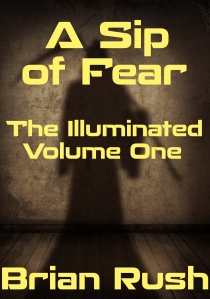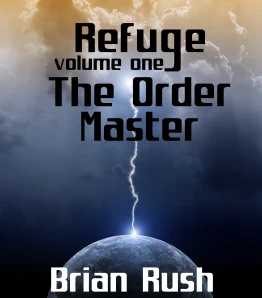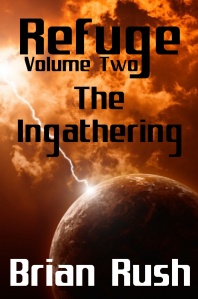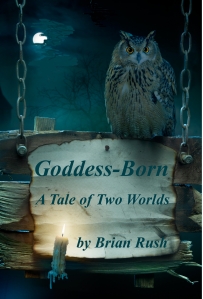 Here’s the second chapter of my new novel, A Sip of Fear, volume one of The Illuminated. I’ll publish the third chapter here next Friday, which is also publication date, so I’ll have links then to the book at Amazon, Kobo, and Smashwords as well. Meanwhile, please enjoy this sample.
Here’s the second chapter of my new novel, A Sip of Fear, volume one of The Illuminated. I’ll publish the third chapter here next Friday, which is also publication date, so I’ll have links then to the book at Amazon, Kobo, and Smashwords as well. Meanwhile, please enjoy this sample.
Shadow was real!
I stood on my balcony the next morning. Our apartment is on the second floor of the building and we have a covered balcony facing the sunrise. The air smelled sweet and, as usual, damp. The sun played a low-pitched note in my mind as it rose triumphantly over the horizon. A crow flew down and landed on my shoulder. That fit my mood. Birds often came to visit, landing on me or on the balcony rail. Pigeons and jays were common, songbirds rarer, and on one occasion I drew a red-tailed hawk.
In a mood like this, a big bird as black as my fear responded to the squawk in my brain and landed on my shoulder. I turned to look into its little dark eye.
“Don’t worry,” I said. “He won’t hurt you. I’m the one who’s dead.”
Shadow was real!
I was jumping to conclusions. I knew that. He might not come to Seattle. He might not come for me. That ominous arrow pointing north from Los Angeles might bend. Maybe he’d go east from Portland, heading for Chicago or for some enclave of earth burrowers out in the countryside.
But I couldn’t help being afraid.
Shadow was real!
The crow screeched in my ear and flew away. Yeah, in this mood I was no fun. Can’t blame you, bird.
Rose came out on the balcony with two cups of coffee. She handed me one, with cream, no sugar. I took a gulp of it, my hands trembling. She hugged me and ran her hand up and down my back.
“I’m scared, Rose.”
“I know. Me, too.”
“What should we do?” I said.
“Thinking about it,” Rose said. “The Illuminated need to know he’s real. Together we might be able to do something about him.”
“What? How do you stop someone like Shadow?”
She shrugged. “How do you kill a dead person? That might be impossible. But maybe we don’t have to kill him to stop him.” She shook her head. “We need more information.”
I had to smile at that. “You Djehuti adepts. You can never have enough data.”
“Well, we don’t want to make a mistake, not with something like this. There’s so much we don’t know. How much of the legend can we trust? Also, how much of the vampire stories are true about Shadow? Can you kill him with a stake through the heart? Can you poison him with garlic? It’s a swamp of misinformation. But I did some more digging into those sightings. Each one, he stayed a little while, a few days or a week, once as long as three weeks. Each time, an Illuminated died. No explanation of how or why. Then Shadow left. It’s reasonable to believe he killed those Illuminated.”
“Yeah. That fits the legend.”
“But he only killed one. You’d expect him to stay and clean the whole town out, kill every Illuminated in the place. He never does. He kills one. Then he leaves, goes to the next town and does it again. He’ll do the same in Portland, then move to the next target. If he comes north, he could stop in Vancouver or Olympia or Tacoma, or skip all of those and come here. Seattle’s the biggest city in Washington and has the most Illuminated. But that’s no guarantee. He could go anywhere.”
I drank some more coffee. I probably shouldn’t; I was wired enough already. “There’s a cowardly part of me that wants to hunker down and pray that he picks someone else to kill. Odds would be in my favor.”
“I know — but.”
“Right. But. But if he doesn’t kill me, he’ll kill someone else. There aren’t that many Illuminated in Seattle and most of them are my friends. Who should I prefer as victim? Marcus down at the Green Woman? Erica? You?”
“No matter who the victim is, we all suffer. We grieve, and we live in fear, and Shadow feeds.”
I sighed. “We need to stop him if we can.”
“And I don’t think we can do it alone.”
“Can you put something on a flash drive so I can show people, prove to them Shadow is a real person?”
She grinned and fished in a pocket. “Already done,” she said, handing me the drive. I pocketed it.
“Well, since Shadow seems to take his time, I guess I can make us some breakfast before I go talk to people. But I’d better not put it off too long.” I kissed Rose and held her, enjoying her smell and the feel of her body while I still could, while we were both still breathing. “I’ll make some phone calls after breakfast.”
ξ
Erica Jenner picked up the phone. I hadn’t been sure she would. “Hello?”
Well, that explained it. She didn’t check caller ID.
“Hi, Erica, it’s Gordon.”
“Oh. Hello.”
“Look, I know you’re still mad at me and I don’t blame you, but don’t hang up.”
“I’m still here.”
“Erica, this is really important. We’re all in danger. I need to talk to you.”
“So talk.”
“I mean in person. I want to show you something.”
A moment of silence, then, “This had better be important.”
“It is.”
“I really don’t want to see you, Gordon.”
“I know.”
“I’ve just gotten to where I can think about dating someone.”
I swallowed. Massive guilt. Erica always knew how to play that card, but in this case I deserved it.
“Well, what’s this about?” she said.
Deep breath. “It’s about Shadow.”
She laughed. “What?”
“Shadow is real.”
“Oh, come on, Gordon.”
“I can prove it.”
“Gordon — wait a minute. You and Rose broke up, right? She dumped you, didn’t she?”
“What? No. No, we’re fine.”
“What game are you playing, Gordon?”
“No game, I’m serious. Shadow is real. He was in Portland a couple weeks ago. He might be coming here. One of us is going to die if he does.”
“Gordon — never mind. I knew you were a two-timing backstabbing jerk, but this is a new low even for you. Don’t call me again.”
Click.
I put my phone on the table and rubbed my eyes. Rose came over and massaged my shoulders. “Starting with Erica might not have been the smartest move,” she said.
I laughed. “Get the worst out of the way,” I said. “So when my ex is on the list, she’s the first one I call. Things can’t get worse after that.”
“Hmm.”
“Who should I try next?”
“Marcus.”
“No, I’ll save him for later. I could use the Green Woman as a meeting venue. Show everyone the evidence at once.”
“Call Marcus. He can help you persuade people to listen. He has that kind of charm. He also likes you better than any of the others, and he has a more open mind than most.”
“I’ll try Frank Nguyen.”
Rose shook her head and smiled. She kissed my cheek and walked away, not saying any more.
Frank wasn’t pissed at me the way Erica was, but he still thought I was crazy. Jenny Carrow didn’t listen, either.
“Call Marcus,” said Rose.
I sighed. “All right. I’ll call Marcus.”
I did. He remained skeptical when the call ended, but invited me to the Green Woman that evening to show him the goods.
Rose was right, of course. She usually is. Sometimes I have to show I can think for myself, though.
Yeah, I know. Dumb. I have a mentat for a girlfriend. I should listen to her.
ξ
I let the doors of the Green Woman close behind me. She hung over the bar — the Green Woman, that is — on a wooden panel like something that would hang over the door of a medieval inn, painted as a gorgeous female face with big green eyes and ivy twined in her green hair. I always liked that image. The Green Woman looked a lot like Ela-Tu, who still wasn’t talking to me.
The bar served as an unofficial gathering place for the Illuminated in Seattle, although of course we weren’t its only customers. Only six Illuminated that I knew of had permanent residences in Seattle at that time: Rose and me, Marcus, Erica, Frank Nguyen, and Jenny Carrow. Doug Walker migrated as did most werewolves, and a few Illuminated probably lived loner lives outside my knowledge, but still the pool of potential Shadow victims wasn’t large. Illumination is rare and precious and I didn’t want to lose any of my peers.
The place was medium busy, mostly with regulars. Marcus tended the bar, taking the mid-day shift before Lana arrived. A middling tall man about my age with black hair cut short and a gym-shaped body, he smiled as I approached. Sally, not an Illuminated, in her twenties, red haired and pretty, carried drinks and bussed tables. I sat at the bar.
“Glass of the house red, please, Marcus,” I said.
“Coming up,” said Marcus. “I want to see this proof of yours, Gordon, but let’s wait until Lana gets here.”
“Okay.” He served me my wine, which fell into the category of “not bad for a house wine.” By the time it reached my lips, though, it could have won awards. Being a bio-mage has plenty of perks to it.
As I sipped and waited, an Illuminated I didn’t recognize came in. She stood no taller than five two and had a petite body that drew my eyes away from her face over their great reluctance. Wavy night-black hair sluiced down her back except for a couple of strands artfully arranged in front to embrace her breasts, which were contained but not concealed by a form-fitting white body suit. Her head was a little large for her body, as usual for short people. It was far from unattractive, though. Her eyes, big and blue as the sky, contrasted sweetly with her hair in the striking combination called “Black Irish” along with her fair skin.
I couldn’t help smiling as I saw her walk in the door. She smiled back. A voice in the corridors of my mind whispered, here comes trouble, but I couldn’t help it. I followed her movements with my eyes, still smiling, as she came up to the bar and sat beside me.
“What will you have, beautiful?” Marcus said.
“That red wine looks nice,” she said in a mellow contralto that made my blood vibrate.
“Coming right up,” Marcus said.
“Allow me,” I said as he served her glass, and applied the same magic to her wine as I had to my own. She sipped it and her eyebrows shot up.
“Oh, my,” she said, “a bio-mage. My name’s Sarah. Sarah Cole.”
“Gordon Greenbough,” I said, holding my hand out. She took it, and I reached for a sense of her Luminous as I touched her hand. I couldn’t get a clear impression, except of presence and considerable mental power.
Sarah laughed. “Asta,” she said.
“Beg pardon?”
“My Luminous. Her name is Asta. I’m a glamor-mage. Illusion, graceful mind-working, that sort of thing.”
“I see.” That made sense. I wondered how much of her beauty consisted of illusion, but what difference did it make? All beauty is illusory.
“Asta is hard to read. I’m new in Seattle, and I’d heard this was the place to introduce myself to the local Illuminated. Glad to see I wasn’t misinformed.” She turned to Marcus. “What’s your name?”
“Marcus Jones.”
“Good to meet you, Marcus,” said Sarah, holding her hand out. He took it, smiling. I noticed that she had long fingers. Graceful hands, like the rest of her. She closed her eyes briefly. I knew that she was reading his Luminous, and would find that Marcus was a tinker-mage. Thotis, his Luminous, made Marcus a designer of amazing inventions that shouldn’t work, but did. Tending bar might seem an unusual occupation for a tinker-mage, but Marcus owns the Green Woman. It’s his cover and his day job.
In fact, it’s not at all unusual for Illuminated to have livelihoods that seem out of touch with our powers. It lets us do what we do discreetly and not attract unwanted attention. I heal people, but I do it in secret and take no credit for it. Meanwhile, I make money as a writer and editor, and nobody connects that with bio-magic.
Might as well plunge right in, I thought. “This may not be the best time to come to Seattle, Sarah.”
She blinked. “Why is that?”
“You’ve heard of Shadow, I imagine.”
Her laugh was as pretty as she was. “Who hasn’t? You’re not saying he lives in Seattle, are you?”
“God, no! What a thought! No, he travels about and doesn’t seem to have a permanent residence, but he last surfaced in Portland two weeks ago. Before that he was in Eugene, before that in Oakland, and before that in Los Angeles. You see the general direction.”
“Hmm. So he might be coming here.” She shook her head. “How do you know all this? And what makes you think there even is a Shadow?”
I sighed. “You don’t believe me, of course.”
“Well, it’s a lot to take in. But I’m listening.”
I smiled. “You think I’m a harmless nut, Sarah. If you thought I might be right, you’d be terrified.”
“I’d be terrified if Shadow was about to drink my blood. He’s not here now. I hope not. If he’s on his way, I can always leave town. I’m good at going unnoticed when I want to.”
At that moment, Lana walked into the bar, tying her apron in place, her dark hair in a tight bun. After she took over for Marcus, he turned to me. “You said you had proof that Shadow is real.”
“Right. Let’s get a table and I’ll show you.” I hoisted my backpack with my laptop in it. The flash drive from Rose was still in my pocket.
ξ
“Wow,” Marcus said. “I never —” He shook his head.
“That’s eye-opening, all right,” said Sarah quietly.
“Yeah,” I said. “It’s odd, isn’t it, that nobody thought to do a test like this before. We were so sure that Shadow was a myth, we didn’t even bother to check the available evidence.”
“Could your friend be wrong?” said Sarah. “You said she cropped out some of the sightings.”
“Yes, but that was less than one sighting in ten. The rest of them fit this pattern linked up by dates. I’m very sure. Shadow is real.”
Silence prevailed at the table after that. Finally, Marcus stood up. “Well,” he said, “I guess I need to help you persuade the other Illuminated. I could start with Erica.”
“She froze me out already,” I said. “No pun intended.”
“You cheated on her, Gordon,” said Marcus. “You’re not the best one to convince the Ice Woman. Her skepticism is off the charts just because it’s you.”
“I guess so. Feel free to try.”
“I can probably get others on your team, but I don’t know how we can stop Shadow even if all of us work together.”
“Why did you call her the Ice Woman?” said Sarah.
“She’s a frost mage,” I said. “She can drain heat out of things. Or people.”
“Well, she might be the answer, then,” Sarah said. “Freeze Shadow solid. Even if it didn’t kill him, what could he do if he’s a block of ice?”
“Maybe,” I said. “The problem is that we just don’t know. We have only the vaguest idea of Shadow’s powers, and we don’t know anything about his weaknesses, if he even has any.”
“Oh, everyone has weaknesses,” said Sarah. “Of course he keeps his a secret. Hell, he keeps his existence a secret. I don’t think he would if he was really invincible. Do you?”
“Probably not,” said Marcus. “Maybe Rose can help us figure out what can stop him.”
“If she has enough data, she can figure out anything,” I said. “She can’t work in the dark, though.”
“Well,” Marcus said, standing up. “I’m going to go phone some people and see if I can get them to take a look at the evidence. That’s the first step. We can get together and talk about the next one after we’re all on board. You two stay as long as you want. If you need anything else, just flag down Sally. I’ll be in the office.” He clapped me on the shoulder, gave Sarah a last wistful smile, and left.
Sarah said, “Well, here I am in the big city, and sure enough, things are exciting.”
I laughed. “Yeah. I could do with a little less excitement, actually. Although we can’t be sure Shadow will come here. We could be worried about nothing.”
“If he doesn’t come to Seattle, we go after him. Right? We can spread the word, get a task force together. Unite the Illuminated world against a common enemy. One step from world peace.”
“Heh.”
“I’m really glad I met you, Gordon. For a lot of reasons.” She smiled and covered my hand with hers, which made me jump a little.
“I’m, uh — I’m with someone,” I said.
“Of course you are,” said Sarah. “Rose. I heard it in your voice. Anyway, bio-mages are always with someone. Usually more than one someone. Right?”
“Not always.”
“Nearly always. That’s what I hear. Not many men say no to me, Gordon, and bio-mages seldom say no to anyone. And I also hear it’s really worthwhile to get one to say yes.” She stood up and kissed my cheek. “I’ll be in touch.”
She walked out, throwing me a last smile over her shoulder.
 Genre: Urban Fantasy with Steampunk Highlights
Genre: Urban Fantasy with Steampunk Highlights











